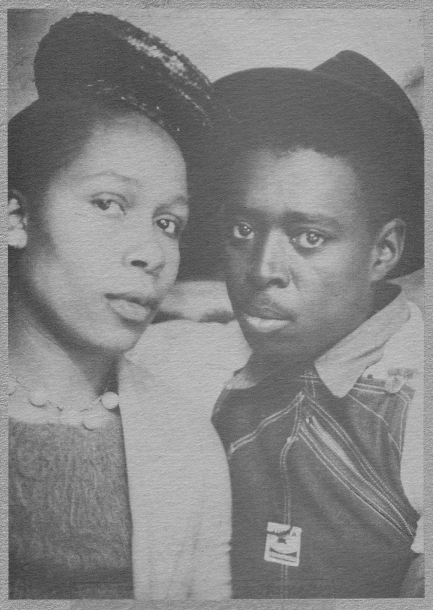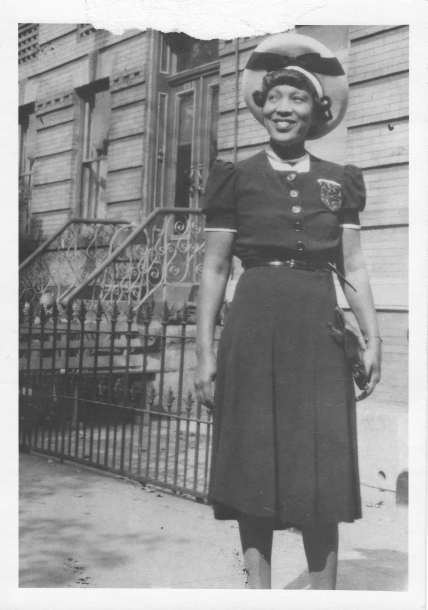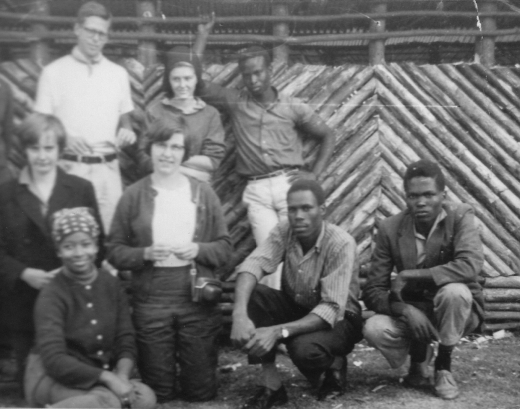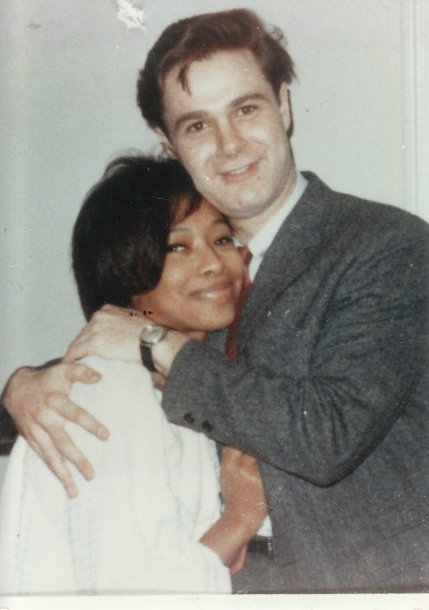Meridian (26 page)

He noticed, above their heads, an addition to the line of letters. A blank sheet of paper and, next to it, forming the end of the line, a photograph of an enormous bull’s-eye. When he stood up close to it he discovered—after much twisting of his head and neck—that it was not a bull’s-eye at all but a gigantic tree stump. A tiny branch, no larger than his finger, was growing out of one side. The piece of paper next to it was not blank, though the handwriting was grotesquely small. Even so, he recognized it as Anne-Marion’s. It contained one line: “Who would be happier than you that The Sojourner did not die?” She had written, also in a minute script, “perhaps me,” but then had half-erased it.
Behind him on the floor Meridian was bending forward again and again to touch her toes, her flushed face tense with determination; a rush of gratitude that she was alive flooded Truman’s body. When she stopped for breath he dropped to the floor beside her and gathered her into his arms. But Meridian leaned against him for only a moment, then she continued to flex and stretch her muscles.
“Truman,” Meridian said, when she lay back, exhausted, on the floor. “Do you remember what happened the last time we went out? Remember how that woman attacked me and then slammed the door in our faces?”
He remembered.
“I never explained to you why she did that. She did it because I know something about her life that she told me, but now she wishes I didn’t know it because she’s afraid of what people will think about her if they know. That woman left her husband because he was infatuated with his dog.”
Truman laughed.
“No, no, I mean it. He was in love with a dog. He bought the best of everything for the dog to eat. He brushed its coat a dozen times a day. He talked to it constantly, ignoring his children and his wife. He let it sleep on the best bed in the guest room. Some nights he would stay with it. When his wife finally screamed and asked him why, he explained that the dog had better qualities than she had. The wife left him. Took all their five children and went to live with her mother. But her mother didn’t want her because the children gave her a headache, and so she convinced the daughter that even if the story she told was true, it would be better to go back to him. Because, after all, he owned his own house and was not stingy or mean. They ate well and he did not come home drunk on the weekends and beat her. The wife had no choice; she went back to her husband because alone she could not feed her children. Of course she made her husband promise to kill the dog.”
“And did he kill the dog?”
Meridian shrugged.
“I suspected that is not the point,” she said.
S
HE WAS STRONG ENOUGH
to go and owned nothing to pack. She had discarded her cap, and the soft wool of her newly grown hair framed her thin, resolute face. His first thought was of Lazarus, but then he tried to recall someone less passive, who had raised himself without help. Meridian would return to the world cleansed of sickness. That was what he knew.
What he
felt
was that something in her was exactly the same as she had always been and as he had, finally, succeeded in knowing her. That was the part he might now sense but could not see. He would never see “his” Meridian again. The new part had grown out of the old, though, and that was reassuring. This part of her, new, sure and ready, even eager, for the world, he knew he must meet again and recognize for its true value at some future time.
“Your ambivalence will always be deplored by people who consider themselves revolutionists, and your unorthodox behavior will cause traditionalists to gnash their teeth,” said Truman, who was not, himself, concerned about either group. To him, they were practically imaginary. It was still amazing to him how deeply Meridian allowed an idea—no matter where it came from—to penetrate her life.
“I hate to think of you always alone.”
“But that is my value,” said Meridian. “Besides, all the people who are as alone as I am will one day gather at the river. We will watch the evening sun go down. And in the darkness maybe we will know the truth.”
She hugged him, long, lingeringly (her nose and lips rooting about at his neck, causing him to laugh), and then she went, walking as if hurrying to catch up with someone.
Truman turned, tears burning his face, and began, almost blindly, to read the poems she had left on the walls. He could not bring himself to read the letters yet. It was his house now, after all. His cell. Tomorrow the people would come and bring him food. Someone would come and milk his cow. They would wait patiently for him to perform, to take them along the next guideless step. Perhaps he would.
“whatever you have done, my brother… know i wish to forgive you ... love you it is not the crystal stone of our innocence that circles us not the tooth of our purity that bites bloody our hearts.”
Truman felt the room begin to turn and fell to the floor. A moment later, dizzy, he climbed shakily into Meridian’s sleeping bag. Underneath his cheek he felt the hard edge of her cap’s visor, he pulled it out and put it on his head. He had a vision of Anne-Marion herself arriving, lost, someday, at the door, which would remain open, and wondered if Meridian knew that the sentence of bearing the conflict in her own soul which she had imposed on herself—and lived through— must now be borne in terror by all the rest of them.
I wish to thank the Radcliffe Institute,
the MacDowell Colony, and the Yaddo Corporation
for their support during the writing of this hook. I also
thank Mel Leventhal and Rebecca Leventhal.
Alice Walker (b. 1944), one of the United States’ preeminent writers, is an award-winning author of novels, stories, essays, and poetry. Walker was the first African-American woman to win the Pulitzer Prize for fiction, which she won in 1983 for her novel
The Color Purple
, also a National Book Award winner. Walker has also contributed to American culture as an activist, teacher, and public intellectual. In both her writing and her public life, Walker has worked to address problems of injustice, inequality, and poverty.
Walker was born at home in Putnam County, Georgia, on February 9, 1944, the eighth child of Willie Lee Walker and Minnie Tallulah Grant Walker. Willie Lee and Minnie Lou labored as tenant farmers, and Minnie Lou supplemented the family income as a house cleaner. Though poor, Walker’s parents raised her to appreciate art, nature, and beauty. They also taught her to value her education, encouraging her to focus on her studies. When she was a young girl, Alice’s brother accidentally shot her in the eye with a BB, leaving a large scar and causing her to withdraw into the world of art and books. Walker’s dedication to learning led her to graduate from her high school as valedictorian. She was also homecoming queen.
Walker began attending Spelman College in Atlanta in 1961. There she formed bonds with professors such as Staughton Lynd and Howard Zinn, teachers that would inspire her to pursue her talent for writing and her commitment to social justice. In 1964 she transferred to Sarah Lawrence College, where she completed a collection of poems in her senior year. This collection would later become her first published book,
Once
(1965). After college, Walker became deeply engaged with the civil rights movement, often joining marches and voter registration drives in the South. In 1965 she met Melvyn Rosenman Leventhal, a civil rights lawyer, whom she would marry in 1967 in New York. The two were happy, before the strain of being an interracial couple in Mississippi caused them to separate in 1976. They had one child, Rebecca Grant Walker Leventhal.
In the late sixties through the seventies, Walker produced several books, including her first novel,
The Third Life of Grange Copeland
(1970), and her first story collection,
In Love & Trouble
(1973). During this time she also pursued a number of other ambitions, such as working as an editor for
Ms.
magazine, assisting anti-poverty campaigns, and helping to bring canonical novelist Zora Neale Hurston back into the public eye.
With the 1982 release of her third novel,
The Color Purple
, Walker earned a reputation as one of America’s premier authors. The book would go on to sell fifteen million copies and be adapted into an Academy Award–nominated film by director Steven Spielberg. After the publication of
The Color Purple
, Walker had a tremendously prolific decade. She produced a number of acclaimed novels, including
You Can’t Keep a Good Woman Down
(1982),
The Temple of My Familiar
(1989), and
Possessing the Secret of Joy
(1992), as well as the poetry collections
Horses Make a Landscape Look More Beautiful
(1985) and
Her Blue Body Everything We Know
(1991). During this time Walker also began to distinguish herself as an essayist and nonfiction writer with collections on race, feminism, and culture, including
In Search of Our Mothers’ Gardens
(1983) and
Living by the Word
(1988). Another collection of poetry,
Hard Times Require Furious Dancing
, was released in 2010, followed by her memoir,
The Chicken Chronicles
, in the spring of 2011.
Currently, Walker lives in Northern California, and spends much of her time traveling, teaching, and working for human rights and civil liberties in the United States and abroad. She continues to write and publish along with her many other activities.

Alice’s parents, Minnie Tallulah Grant and Willie Lee Walker, in the 1930s. Willie Lee was brave and hardworking, and Minnie Lou was strong, thoughtful, and kind—and just as hardworking as her husband. Alice remembers her mother as a strong-willed woman who never allowed herself or her children to be cowed by anyone. Alice cherished both of her parents “for all they were able to do to bring up eight children, under incredibly harsh conditions, to instill in us a sense of the importance of education, for instance, the love of beauty, the respect for hard work, and the freedom to be whoever you are.”

Harlem Renaissance writer Zora Neale Hurston during her days in New York City. Hurston, who fell into obscurity after her death, had a profound influence on Walker. Indeed, Walker’s 1975 essay, “In Search of Zora Neale Hurston,” played a crucial role in resurrecting Hurston’s reputation as a major figure in American literature. Walker paid further tribute to her “literary aunt” when she purchased a headstone for Hurston’s grave, which had gone unmarked for over a decade. The inscription on the tombstone reads, “A Genius of the South.”

Alice (front) in Kenya in 1965. She traveled there to help build the school pictured in the background as part of the Experiment in International Living Program. It was here that Walker first witnessed the practice of female genital mutilation, a practice that she has since worked to eradicate.

Walker with her former husband, Melvyn Leventhal, a Brooklyn native. The couple met in Mississippi and bonded over their mutual involvement in the struggle for civil rights—he as a budding litigator for the NAACP Legal Defense and Education Fund, she as one of the organization’s workers responsible for taking depositions from disenfranchised black voters. Despite disapproval from their respective families, Alice and Melvyn wed in New York City in 1967. They then returned to Mississippi, where they were often subjected to threats from the Ku Klux Klan. Eventually the pressures of living in the violent, segregated state, coupled with their divergent career paths, caused the pair to drift apart. They divorced amicably in 1976.
